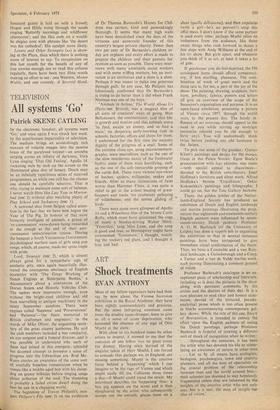TELEVISION
All systems 'Go'
Patrick SKENE CATLING
In the electronic boudoir, all systems were `Go,' and once again I was struck last week by the superhuman impartiality of television. The medium brings an astonishingly rich mixture of volatile images into the passive brain of the paralysed voyeur—an amoeba surging across an infinity of darkness, Vera Lynn singing 'That Old Feeling', Apollo 14 rocketing inch by inch up the screen to the illuminated glass disc of lunacy. Death may be an infinitely repetitious series of received programmes, so while one still has the chance
one should be carefully selective. That is why, trying to maintain some sort of balance, I never watch films like Last Year in Marien- bad (BBc 2) without also watching plenty of Play School and Jackanory (BBc 1).
A newsreel shot from Saigon called atten- tion to the fact that we have now begun the Year of The Pig. In honour of that most humanly intelligent of animals, a group of `ex-communists' were.shown being rewarded at the trough at the end of their anti- communist indoctrination course. During the banquet a South Vietnamese Government psychological warfare team of girls sang pop songs, which, of course, made my spine tingle with pride.
Look, Stranger (BBc 2), which is almost always good for a sympathetic sigh of
Aesthetic pity, once again beautifully illus- trated the courageous obstinacy of English eccentrics with 'The Great Working of Steam Engines at Stourpaine Bushes,' a documentary about a convention of the Dorset Steam and Historic Vehicles Club.
The names were impressive enough, even without the bright-eyed children and old men marvelling at antique machinery in the misty September sunshine. There were engines called 'Supreme' and 'Perseverance' and 'Patience'—`the finest memorial to British craftsmen and engineers,' in the words of Mike Oliver, the organising secre- tary of the great steamy jamboree. He said the club members included a bus conductor,
an eye surgeon and a funeral director, and it was possible to understand why each of
them had joined in this energetic, splendid but doomed attempt to preserve a sense of progress into the Edwardian era. Rod Mc- Kuen creates an awareness of the same sort
of wistfully hopeless romanticism when he romps like a-middle-aged boy with his sheep- dog on grassy hillsides before singing songs about pollution of the soul. The sheepdog Is probably a failed circus dwarf doing the best he can in a changing world. The beginning of Trevor Philpott's two- part Philpott's File (me 2) on the evolution of Dr Thomas Barnardo's Homes for Chil- dren was earnest, kind and painstakingly
thorough. It seems that many high walls have been demolished since the days of the virtuous and autocratic founder of this country's largest private charity. Fewer than two per cent of Dr Barnardo's children to- day are orphans and every effort is made to prepare the children and their parents for reunion as soon as possible. There were inter- views with many admirable social workers and with some willing mothers, but an insti- tution is an institution and a slum is a slum. Perhaps it was meant to make one generous through guilt. In any case, Mr Philpott has laboriously confirmed that Dr Barnardo's is trying to do better than it did when Frank Norman was one of the boys.
`Animals in Action,' The World About Us (Paris/stir Bristol), was a magical film of all sorts of creatures' ways of going. Max Bellancourt, the commentator, said that life is growth and motion and that animals move `to feed, escape an enemy, and to find a mate,' no desperate,. early-morning rush to schools, factories, offices and shops for them. I understood for the first time the majestic dignity of the progress of a snail. Some of the extreme close-ups, using microcinemato- graphy, were marvellous, such as the one of the slow murderous dance of the freshwater hydra; some of them were horrifying, such as the one of the soft inexorable groping of the cuttle fish. There were victims'-eye-views of leeches, spiders, millepedes, snakes and lizards. After so many intimations of fates worse than Hammer Films, it was quite a relief to get to the ardent leaping of grass- hoppers and toads, the exuberant galloping of wildebeeste, and the serene gliding of birds.
There were some more glimpses of Apollo 14 and a Wheelbase film of the Monte Carlo Rally, which must have quickened the cogs of many a Sunday-driving Walter Mitty. `Yesterday,' sang Miss Lynn, and she sang it good and true, as Hemingway might have commented. 'Tomorrow,' I thought, watch- ing the rocket's red glare, and I thought it true and bad.


































 Previous page
Previous page